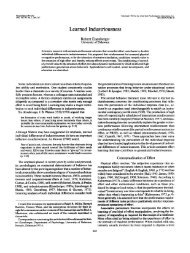Perceived Organizational Support
Perceived Organizational Support
Perceived Organizational Support
Create successful ePaper yourself
Turn your PDF publications into a flip-book with our unique Google optimized e-Paper software.
Coyle-ch10.qxd 1/16/04 3:00 PM Page 224<br />
224 Exchange Nature of Employment Relationship<br />
Liden, R. C., Sparrowe, R. T., and Wayne, S. J. (1997). “Leader–member exchange theory: The<br />
past and potential for the future,” in G. R. Ferris (ed.), Research in Personnel and Human<br />
Resources Management, Vol. 15 (Stamford, CT: JAI Press), 47–119.<br />
Masterson, S. S., Lewis, K., Goldman, B. M., and Taylor, M. S. (2000). “Integrating justice and<br />
social exchange: The differing effects of fair procedures and treatment on work relationships.”<br />
Academy of Management Journal, 43: 738–48.<br />
McLean Parks, J., Kidder, D. L., and Gallagher, D. G. (1998). “Fitting square pegs into round<br />
holes: Mapping the domain of contingent work arrangements onto the psychological<br />
contract.” Journal of <strong>Organizational</strong> Behavior, 19: 697–730.<br />
Moorman, R. H., and Harland, L. K. (2002). “Temporary employees as good citizens: Factors<br />
influencing their OCB performance.” Journal of Business and Psychology, 17: 171–87.<br />
—— Blakely, G. L., and Niehoff, B. P. (1998). “Does perceived organizational support mediate<br />
the relationship between procedural justice and organizational citizenship behavior?”<br />
Academy of Management Journal, 41: 351–7.<br />
Morrison, E. W. (1993a). “Longitudinal study of the effects of information seeking on<br />
newcomer socialization.” Journal of Applied Psychology, 78: 173–83.<br />
—— (1993b). “Newcomer information seeking: Exploring types, modes, sources, and<br />
outcomes.” Academy of Management Journal, 36: 557–89.<br />
—— and Robinson, S. L. (1997). “When employees feel betrayed: A model of how psychological<br />
contract violation develops.” Academy of Management Review, 22: 226–56.<br />
Nollen, S., and Axel, H. (1996). Managing Contingent Workers. New York: American<br />
Management.<br />
Popovich, P., and Wanous, J. P. (1982). “The realistic job preview as persuasive communication.”<br />
Academy of Management Review, 7: 570–8.<br />
Rhoades, L., and Eisenberger, R. (2002). “<strong>Perceived</strong> organizational support: A review of the<br />
literature.” Journal of Applied Psychology, 87: 698–714.<br />
—— —— and Armeli, S. (2001). “Affective commitment to the organization: The contribution<br />
of perceived organizational support.” Journal of Applied Psychology, 86: 825–36.<br />
Robblee, M. (1998). “Confronting the threat of organizational downsizing: Coping and health.”<br />
Unpublished Master’s thesis, Carleton University.<br />
Robinson, S. L. (1996).“Trust and breach of the psychological contract.” Administrative Science<br />
Quarterly, 41: 574–99.<br />
—— and Morrison, E. W. (1995). “Psychological contracts and OCB: The effect of unfulfilled<br />
obligations on civic virtue behavior.” Journal of Applied Psychology, 16: 289–98.<br />
—— and Rousseau, D. M. (1994). “Violating the psychological contract: Not the exception but<br />
the norm.” Journal of <strong>Organizational</strong> Behavior, 15: 245–59.<br />
—— Kraatz, M. S., and Rousseau, D. M. (1994). “Changing obligations and the psychological<br />
contract: A longitudinal study.” Academy of Management Journal, 37: 137–52.<br />
Rousseau, D. M. (1995). Psychological Contracts in Organizations. Thousand Oaks, CA: Sage.<br />
—— (1997). “<strong>Organizational</strong> behavior in the new organizational era.” Annual Review of<br />
Psychology, 48: 515–46.<br />
Salanick, G. R., and Pfeffer, J. (1978). “A social information processing approach to job attitudes<br />
and task design.” Administrative Science Quarterly, 23: 224–53.<br />
Schopler, J. (1970). “An attribution analysis of some determinants of reciprocating a benefit,”<br />
in J. Macaulay and L. Berkowitz (eds.), Altruism and Helping Behavior (New York: Academic<br />
Press), 231–8.<br />
Schuler, R. S., and Jackson, S. E. (1987). “Linking competitive strategies with human resources<br />
management practices.” Academy of Management Executive, 1: 207–19.



